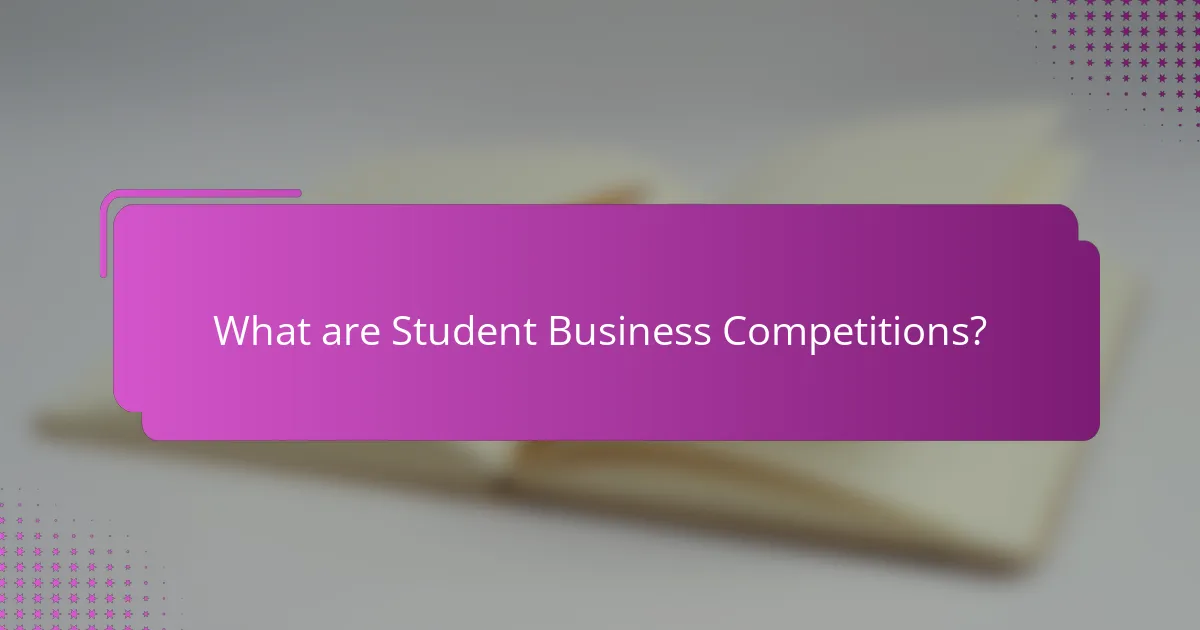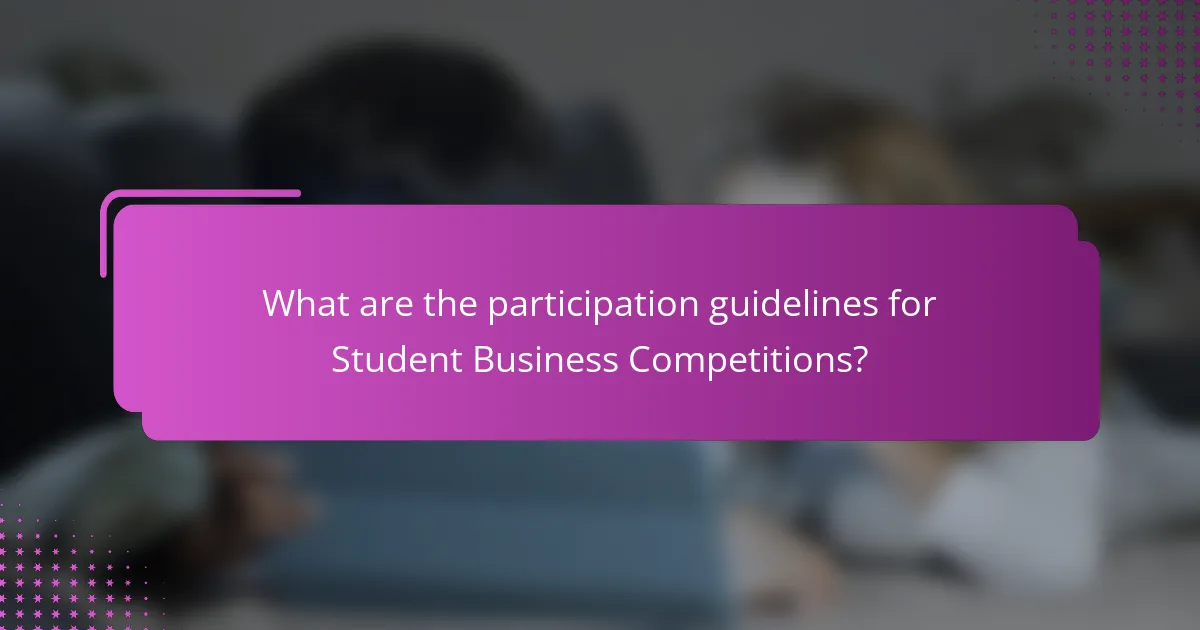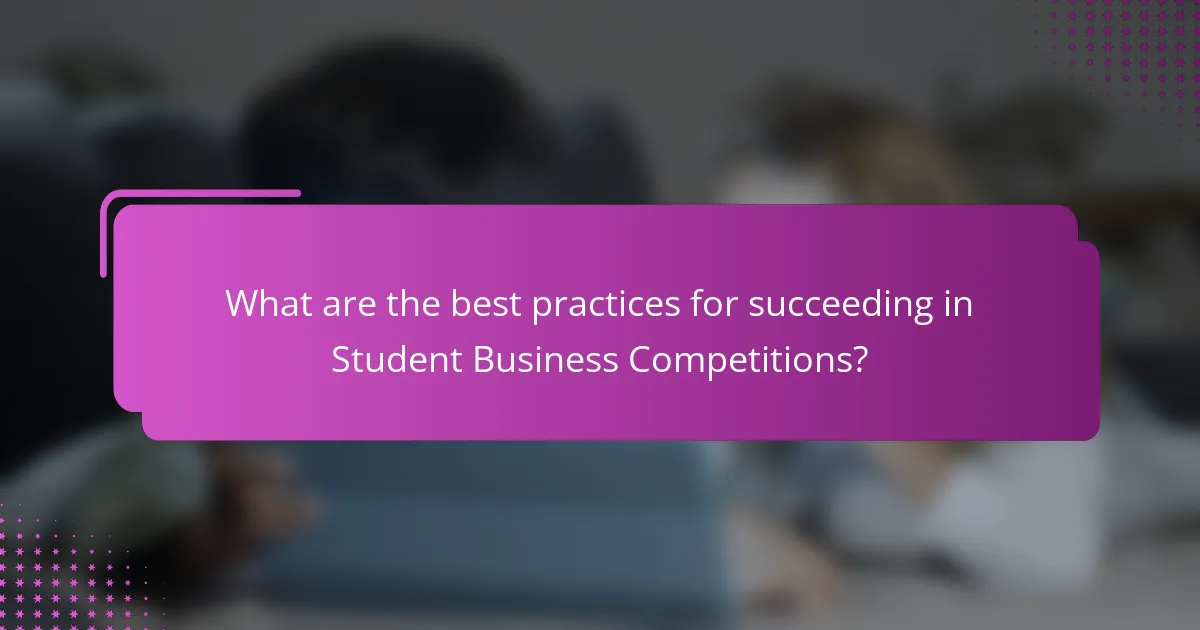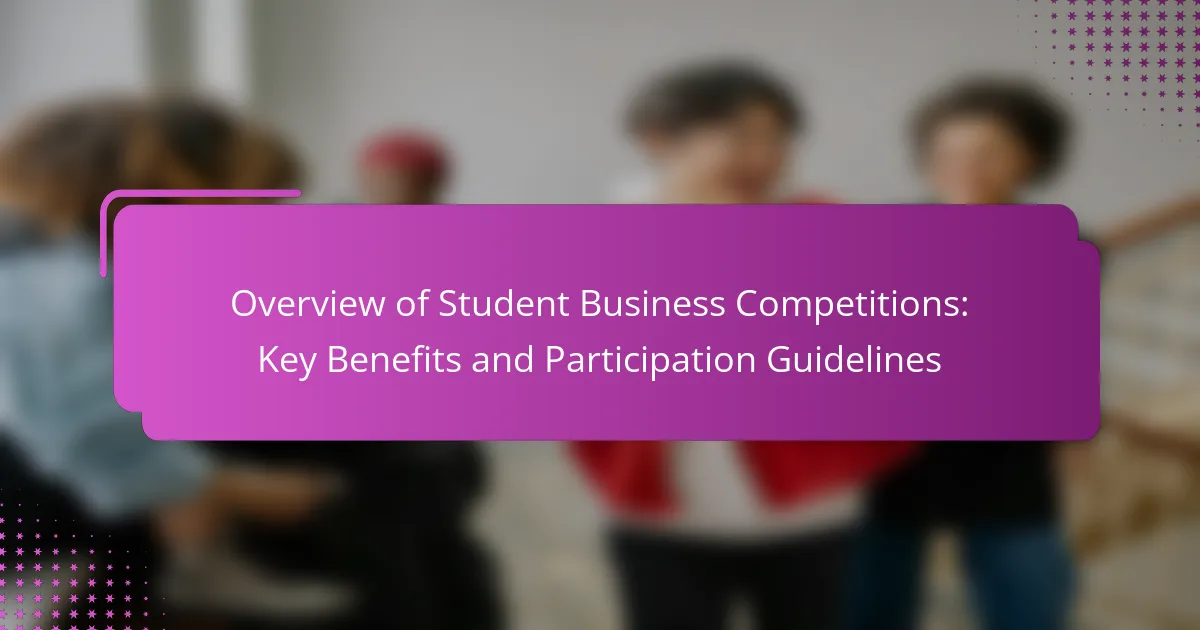Student business competitions are structured events designed for students to demonstrate their entrepreneurial skills through activities such as creating business plans and presenting innovative ideas. These competitions occur at various levels, including local, national, and international, and involve participants from diverse academic backgrounds who often work in teams. Key benefits of participating include networking opportunities with industry professionals, access to mentorship, and potential funding for successful business concepts. This article outlines the essential participation guidelines, including eligibility criteria and preparation strategies, emphasizing the importance of thorough research and effective presentation skills for success in these competitions.

What are Student Business Competitions?
Student business competitions are structured events where students showcase their entrepreneurial skills. These competitions often involve creating business plans, presenting ideas, and competing for prizes. Participants typically come from various academic backgrounds and work in teams or individually. Competitions can take place at local, national, or international levels. They provide students with opportunities to network with industry professionals. Many competitions also offer mentorship and resources to help participants refine their ideas. Successful entries can lead to funding or support for launching a business. Events like the Global Student Entrepreneur Awards illustrate the significance of these competitions in fostering innovation.
How do Student Business Competitions function?
Student business competitions function as structured events where participants create and present business plans or solutions. These competitions often simulate real-world business challenges. Participants typically form teams to collaborate on their projects. They conduct market research, develop strategies, and create presentations. Competitions usually feature a panel of judges from the business community. Judges evaluate submissions based on criteria such as innovation, feasibility, and presentation skills. Prizes often include scholarships, internships, or funding for the winning teams. Many universities and organizations host these competitions to foster entrepreneurship and practical skills among students.
What are the key components of Student Business Competitions?
Key components of Student Business Competitions include team collaboration, problem-solving, and presentation skills. Teams typically consist of students from various disciplines. They work together to develop innovative business solutions. Competitions often present real-world business challenges. Participants must analyze the problem and propose viable strategies. Judges evaluate submissions based on criteria such as creativity and feasibility. Networking opportunities with industry professionals are also a significant aspect. Finally, prizes and recognition can motivate students to participate and excel.
How do these components contribute to the competition experience?
The components of student business competitions enhance the competition experience by fostering skill development and collaboration. Participants engage in real-world problem-solving, which improves critical thinking abilities. Networking opportunities allow students to connect with industry professionals, broadening their career prospects. Mentorship from experienced judges provides valuable feedback, enhancing learning outcomes. Team dynamics encourage collaboration, teaching participants how to work effectively in groups. Additionally, the competitive environment motivates participants to perform at their best. These elements collectively create a rich learning atmosphere that prepares students for future business challenges.
Why are Student Business Competitions important for students?
Student business competitions are important for students as they enhance practical skills and foster innovation. These competitions provide a platform for students to apply theoretical knowledge in real-world scenarios. Participants gain experience in problem-solving, teamwork, and strategic thinking. Additionally, they often receive mentorship from industry professionals. This exposure helps students build professional networks. According to a study by the National Association of Colleges and Employers, 80% of employers value practical experience in candidates. Thus, student business competitions significantly contribute to career readiness.
What skills do students develop through participation?
Students develop critical thinking, teamwork, communication, and problem-solving skills through participation. Critical thinking enhances students’ ability to analyze situations and make informed decisions. Teamwork fosters collaboration, teaching students how to work effectively with others towards a common goal. Communication skills improve as students present ideas and engage in discussions. Problem-solving skills are honed as students tackle real-world challenges during competitions. These skills are essential for success in both academic and professional environments. Research shows that participation in business competitions significantly boosts these competencies, preparing students for future careers.
How do these competitions enhance career opportunities?
Competitions enhance career opportunities by providing practical experience and networking prospects. Participants develop essential skills such as teamwork, problem-solving, and leadership. These skills are highly valued by employers. Additionally, competitions often involve industry professionals as judges or mentors. This exposure can lead to valuable connections in the business world. Many companies actively seek out competition participants for internships and job openings. Statistics show that over 70% of participants report improved employability after competing. Such experiences distinguish candidates in a competitive job market.
What are the key benefits of participating in Student Business Competitions?
Participating in Student Business Competitions offers several key benefits. First, it enhances practical business skills. Students apply theoretical knowledge in real-world scenarios. This hands-on experience improves problem-solving and critical thinking abilities. Second, competitions foster teamwork and collaboration. Participants often work in groups, enhancing communication and interpersonal skills. Third, they provide networking opportunities. Students connect with industry professionals and potential employers. Fourth, competitions can boost resumes. They demonstrate initiative and commitment to personal development. Finally, many competitions offer prizes or scholarships. This financial support can be beneficial for students’ educational pursuits.
How do competitions foster networking opportunities?
Competitions foster networking opportunities by bringing together individuals with shared interests and goals. Participants can connect with peers, mentors, and industry professionals. These interactions often lead to valuable relationships that extend beyond the competition. Networking occurs through team collaboration, workshops, and presentations. Events typically include networking sessions designed for participants to engage with each other. According to a study by the National Association of Colleges and Employers, 85% of jobs are filled through networking. This statistic highlights the importance of building connections during competitions. As a result, competitions serve as a platform for future career opportunities and collaborations.
What role do mentorship and guidance play in these competitions?
Mentorship and guidance play a crucial role in student business competitions. They provide participants with valuable insights and industry knowledge. Mentors help students refine their business ideas and strategies. This guidance often leads to improved performance in competitions. Research shows that teams with mentorship achieve higher success rates. For example, a study by the Kauffman Foundation found that mentored teams outperformed unmentored ones by 30%. Mentorship fosters networking opportunities, connecting students with industry professionals. This can lead to internships and job offers post-competition. Overall, mentorship enhances learning and increases the likelihood of success in student business competitions.

What are the participation guidelines for Student Business Competitions?
Participation guidelines for Student Business Competitions typically require students to be enrolled in a relevant academic program. Participants must form teams, often with a specified maximum number of members. Competitions may have eligibility criteria based on academic standing or age. Registration is usually required before a deadline, along with submission of a business proposal or plan. Teams may need to prepare presentations for judges. Adherence to competition rules and ethical standards is mandatory. Specific guidelines can vary by competition, so reviewing the official rules is essential.
Who is eligible to participate in Student Business Competitions?
Students currently enrolled in a higher education institution are eligible to participate in Student Business Competitions. This includes undergraduates and graduates from universities and colleges. Some competitions may also allow recent graduates or students from specific programs. Eligibility criteria often vary by competition. Many competitions require participants to form teams, typically consisting of 2 to 5 members. Some competitions may have age restrictions or require participants to meet certain academic standards. It is essential to review the specific rules for each competition to confirm eligibility.
What are the common requirements for student participants?
Common requirements for student participants include being enrolled in a degree program. Participants typically must be full-time students at an accredited institution. Many competitions require students to be in a specific year of study, such as undergraduate or graduate levels. Participants often need to form teams, with a minimum and maximum number of members specified. Registration by a certain deadline is usually mandatory. Some competitions may also require a submission of a business plan or proposal prior to participation. Eligibility criteria may include age limits or restrictions based on prior competition experience. These requirements ensure that participants are adequately prepared and qualified for the competition format.
Are there any restrictions based on academic programs or levels?
Yes, there are restrictions based on academic programs or levels. Many student business competitions are open only to specific academic programs, such as business or entrepreneurship. Some competitions may require participants to be enrolled in undergraduate or graduate-level programs. Additionally, certain competitions may have eligibility criteria related to the year of study, such as only allowing first-year or final-year students. These restrictions ensure that participants are adequately prepared for the competition’s challenges. Each competition typically outlines its specific eligibility requirements in its official rules or guidelines.
How can students prepare for participation in these competitions?
Students can prepare for participation in competitions by researching the competition rules and guidelines. Understanding the specific requirements helps in strategic planning. They should also form a diverse team with complementary skills. Collaboration enhances creativity and problem-solving abilities. Practicing presentation skills is crucial for effective communication. Engaging in mock competitions can simulate real scenarios. Seeking feedback from mentors improves performance. Finally, managing time effectively ensures thorough preparation before the event.
What resources are available for students to enhance their skills?
Students can enhance their skills through various resources. These include workshops, online courses, and mentorship programs. Workshops often focus on specific skills like public speaking or teamwork. Online platforms like Coursera and Udemy offer courses on business and leadership. Mentorship programs connect students with industry professionals. Many universities provide access to career centers that offer skill-building resources. Networking events also provide opportunities to learn from peers. Additionally, student business competitions serve as practical experiences to apply skills. These resources collectively support skill enhancement for students.
How can students effectively form teams for competitions?
Students can effectively form teams for competitions by identifying complementary skills among members. Each team member should bring unique strengths to the group. This diversity enhances problem-solving and creativity. Students should also establish clear roles based on these skills. Defining responsibilities ensures accountability and efficiency. Communication is vital for team cohesion. Regular meetings help maintain focus and address challenges. Additionally, students should set shared goals to align their efforts. Research shows that teams with clear objectives perform better in competitive settings.

What are the best practices for succeeding in Student Business Competitions?
To succeed in Student Business Competitions, participants should focus on thorough preparation. This includes understanding the competition criteria and requirements in detail. Participants should also conduct comprehensive market research relevant to their business idea. Developing a clear and compelling business plan is essential. Teams must practice their presentations multiple times to ensure clarity and confidence. Engaging with mentors for feedback can provide valuable insights. Networking with other participants can lead to collaboration opportunities. Finally, managing time effectively during the competition is crucial for success. These practices are supported by the experiences of past winners who emphasize preparation and teamwork.
What strategies can students employ to stand out in competitions?
Students can employ several strategies to stand out in competitions. First, they should thoroughly understand the competition requirements. This ensures their submission aligns with the judges’ expectations. Second, they must demonstrate creativity and innovation in their ideas. Unique concepts often capture attention and set participants apart. Third, effective communication is crucial. Clear and persuasive presentations can significantly impact the judges’ perception. Fourth, students should collaborate with peers to enhance their projects. Diverse skills can lead to more comprehensive solutions. Fifth, practicing their pitches can improve delivery and confidence. Research shows that well-prepared presentations often receive higher scores. Finally, seeking feedback from mentors can refine their work. Constructive criticism can lead to substantial improvements. These strategies collectively help students differentiate themselves in competitive environments.
How important is research in preparing for a competition?
Research is crucial in preparing for a competition. It allows participants to understand the competition’s rules and expectations. Research also helps identify successful strategies used by previous competitors. Gathering data on the market and audience can inform decision-making. Competitors who conduct thorough research often perform better. Studies show that preparation linked to research increases success rates. For instance, a study by the Harvard Business Review found that well-prepared teams have a higher likelihood of winning. Therefore, research significantly enhances a competitor’s chance of success.
What role does practice play in achieving success?
Practice is essential for achieving success. It develops skills and enhances performance over time. Consistent practice leads to mastery of tasks. Research shows that deliberate practice can improve performance by up to 30%. This is evident in sports, music, and academic fields. For instance, elite athletes train for hours daily to refine their techniques. Additionally, studies indicate that individuals who practice regularly are more likely to reach their goals. This correlation underscores the importance of practice in the journey toward success.
What common challenges do participants face in Student Business Competitions?
Participants in Student Business Competitions face several common challenges. Time management is a significant issue due to tight deadlines for project completion. Limited resources can hinder participants’ ability to develop comprehensive business plans. Team dynamics often create conflicts that can disrupt collaboration. Additionally, participants may struggle with public speaking and presentation skills during pitches. Understanding competition criteria can also be challenging, leading to misalignment with judges’ expectations. Finally, participants often experience high levels of stress and pressure to perform well, which can impact their overall effectiveness.
How can students overcome time management issues during competitions?
Students can overcome time management issues during competitions by implementing structured planning and prioritization techniques. Creating a detailed schedule helps allocate specific time slots for each task. Utilizing tools like calendars or apps can enhance organization. Setting clear deadlines for each segment of work fosters accountability. Breaking tasks into smaller, manageable parts prevents overwhelm. Regularly reviewing progress allows for adjustments in the plan. Seeking feedback from peers can provide new perspectives on time allocation. These strategies have been shown to improve efficiency and focus in competitive settings.
What strategies can help deal with competition stress?
Effective strategies to deal with competition stress include time management, preparation, and relaxation techniques. Time management helps students allocate sufficient time for study and practice. This reduces last-minute panic and enhances confidence. Preparation involves understanding the competition format and practicing relevant skills. Familiarity with the competition can mitigate anxiety. Relaxation techniques, such as deep breathing and mindfulness, help calm the mind. Research indicates that these methods can significantly lower stress levels in competitive environments. A study by the American Psychological Association found that mindfulness can improve focus and reduce anxiety in students.
What tips can enhance the overall competition experience?
To enhance the overall competition experience, participants should prepare thoroughly and practice extensively. Effective preparation includes researching the competition format and guidelines. Participants should also develop a clear strategy and set specific goals. Networking with peers and mentors can provide valuable insights. Time management is crucial during the competition. Participants should allocate time wisely for each task. Utilizing feedback from judges can improve future performances. Engaging in team-building activities can strengthen collaboration among team members. Studies show that participants who engage in these practices report higher satisfaction and performance levels.
Student business competitions are structured events that allow students to showcase their entrepreneurial skills through the creation and presentation of business plans. This article provides an overview of the key components, benefits, and participation guidelines for these competitions, highlighting the practical skills students develop, such as teamwork, problem-solving, and critical thinking. Additionally, it discusses the importance of mentorship, networking opportunities, and strategies for success, while addressing common challenges participants may face. Understanding these aspects can significantly enhance students’ career readiness and employability in the competitive job market.
